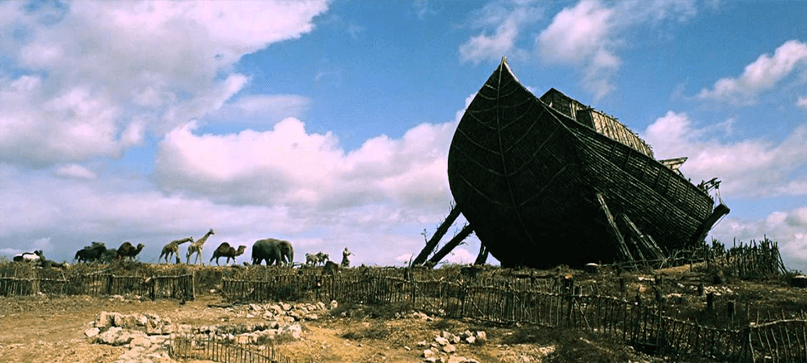Parashat Noach

Parashat Noach is the second weekly Torah portion in the Book of Genesis. It brings us from the decree of the Flood to the introduction of Abram; its main protagonist is the eponymous Noah, one of the most intriguing biblical characters, as he echoes Adam in some ways and presages Moses in others.
The first section (6:9-7:16) describes how God decides to destroy the earth — man, beast, bird — due to the prevalence of human violence and corruption. God regrets the creation of man, but since Noah is righteous, he and his wife, along with his three sons and three daughters-in-law, are selected to survive the coming deluge in an ark (teiva). This term appears only once more throughout Scripture, when baby Moses is placed in a teiva to escape Pharaoh’s decree of drowning. On the other hand, God’s command to Noah to spend the last seven days before the Flood gathering the animals mirrors the Creation story, particularly when God brings the animals before Adam in Eden (2:18-20).
The next section (7:17-8:14) describes the Flood itself: forty days and forty nights of torrential rain, as the teiva floats above all the mountains. Even after the rains stop and the waters recede to the mountaintops, Noah waits forty days to open the hatch. This foreshadows Moses’ spiritual experiences after ascending Mount Sinai, spending forty days and forty nights with God repeatedly. Now we return to the week being the dominant unit of time, as Noah sends out a raven and then a dove to see if it is safe. The symbol of the reborn earth is an olive leaf, echoing the fig leaf of Adam and Eve.
In the next section (8:15-9:17), Noah is told by God to leave the Ark, taking his family and all the animals and birds with him — and to be fruitful and multiply, just as Adam and Eve were told. Then, like Moses, he is given a set of laws, forming a covenant, symbolized by the rainbow. These are the Noahide laws that bind all of humanity, which descends from Noah through his three sons: Shem, Ham and Japheth.
However, in the next section (9:18-11:9), we see that the strain of being both the father of humanity and the founder of civilization proves too much for Noah. Noah plants a vineyard and gets drunk, uncovering himself in his tent, recalling the nakedness of Adam and Eve. However, Noah’s three sons do not fight amongst themselves; their progeny, the seventy nations of the world, share a language and a home. What they lack is spiritual guidance.
This brings us to follow the line of Shem for ten generations (11:10-32), through his great-grandson Eber (source of the term “Hebrew”), all the way to Abram, who sets out from Ur of the Chaldees to the Land of Canaan.
The portion from the Prophets comes from the fifty-fourth chapter of the Book of Isaiah, which talks about God’s remembrance of the waters of Noah and His covenant with humanity.

